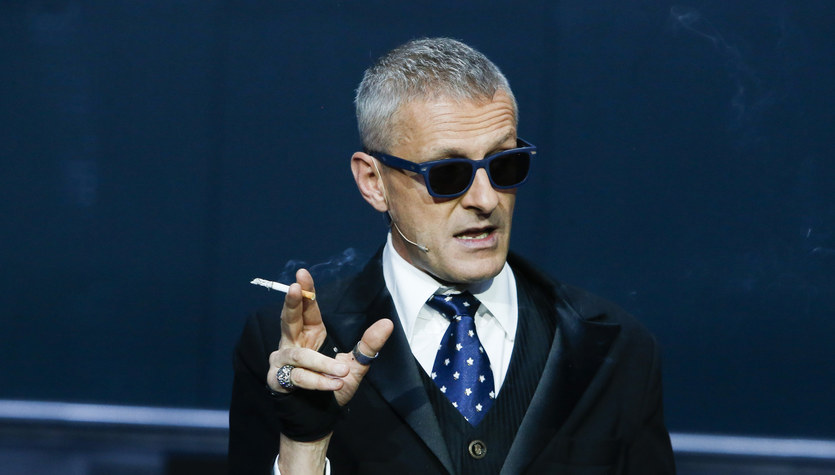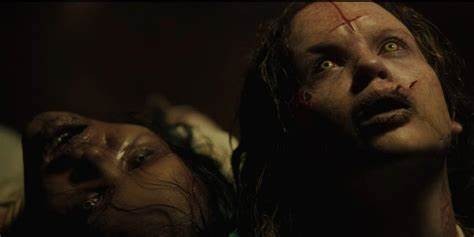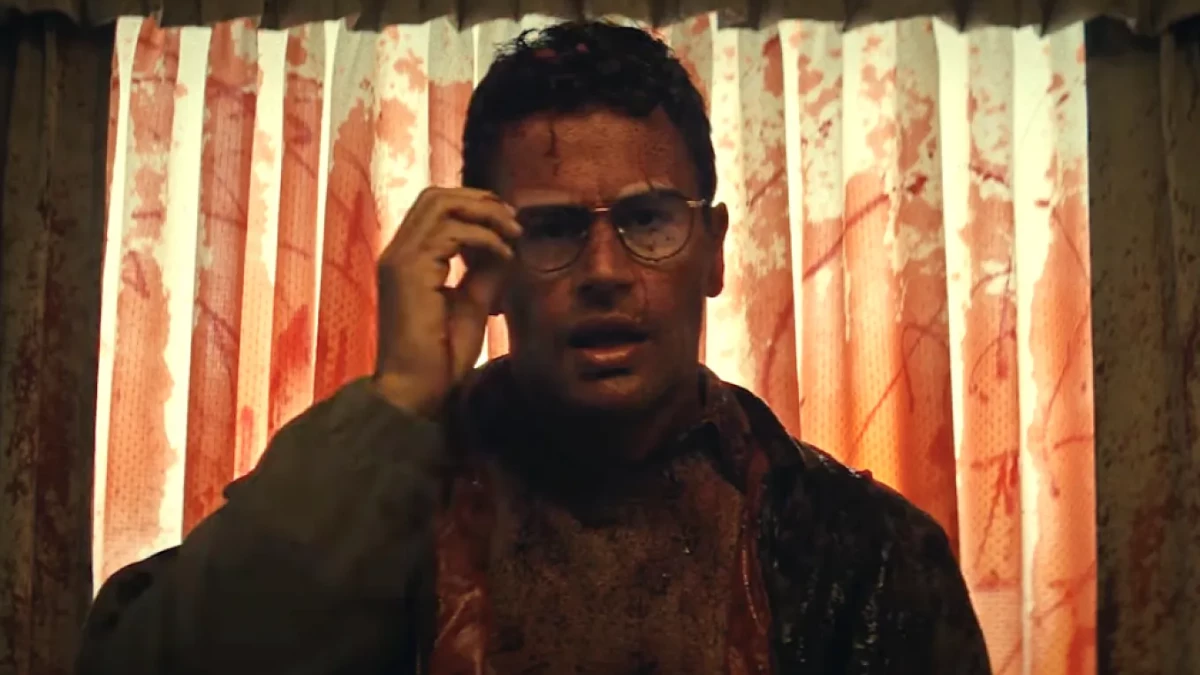Polish Mexican co-production ‘weaker link’ It premiered at the Venice Film Festival last year. Joaquin Del Paso is the director and screenwriter of this powerful personal story about an elite boys’ school and religious indoctrination. A Mexican who spent several years in Poland studying in the cinematography department at the Lodz Film School.
In one of the main roles in his second feature-length production, he decided to choose a respected Polish theater and film actor Jacek Bonidzialek. He himself argues that it was for him one of the greatest professional adventures of his life. Not only because of the strangeness that accompanies the film, but also because of the fact that he played in Spanish, not knowing the language …
Cuba Armata talks to Jacek Bonidzialek about the dangerous relationship between religion and power, an oppressive education system, toxic masculinity, and what a strong man is for him today.
Cuba Armata: Is it true that Joaquin del Paso saw you not in Poland, but in Mexico, where you went with one of Krzysztof Warlikowski’s plays?
Jacek Monday: – There is a funny anecdote connected to it. After the show, the embassy organized a dinner in the center of Mexico City, in a bar near the theater. Joaquin, who speaks Polish well, because he studied at the cinematography department at the Film School in ód, really wanted to meet us there and, having this project in his head, talk about it. Except that no one would let him in there, as if we were some kind of celebrity protected by bodyguards. People know us a lot, but we really aren’t, and we don’t act like that.
What did you like most about the script for the film, written in Spanish and set in Mexico?
– When I first read the text, in addition to the joy and tickle of my ego, there was a fear that I would deal with it at all. And at the same time an amazing desire that everything will work out. Largely because of the strangeness of the design.
It’s a very complicated story about an elite Catholic school of great peopleopców, his job is to shape the future leaderThis is the country.
– The script was too complicated in the original version. Not everything was so clear to me, at least on a cultural level. The character I play, Professor Storr, is a lay employee of the structures surrounding the church. This organization was invented for the sake of the movie, but it’s somewhat inspired by Opus Dei, who also works with us and funds schools through some of our sister organizations, because they can’t officially do that. It’s fun because it is tied to the Catholic faith, leans on the poor and the weak, telling stories of love, equality, and justice, while being the custodian of a predatory college elite. In Mexico and other countries like it, this tradition is very strong, and I read about it quite a bit when preparing for the role, but I also spoke to Joaquin.
Who attended such a school for a year.
– These are places that do not recognize divorce, and in the event of a divorce of parents, the child immediately leaves school. Joaquin’s parents divorced and tried to hide the truth. But somehow it came out. Joaquin was then called to the principal’s office, where he was absurdly accused of stealing a pizza from the school cafeteria. Of course he denied everything, but that doesn’t matter. He was told that he would either confess to the whole school and face severe punishment, or he would be expelled. Fortunately, his parents took him from there and saved him from this madness, but such persecution should cause significant changes in the psyche of the child. I think that’s why this script was written, and it’s actually very personal. I liked the coherence of this text, and at the same time a kind of “non-interference”. On the one hand, it is very powerful, but at the same time everything is not “released” there, and there is no clarity. It can be interpreted in many different ways. The two greatest Ultras, the two who define the oppression of this world, are the headmaster and my character. The first uses soft persuasion and indoctrination, and the second, in turn, provokes radicalization and violence.
What do you associate education with? You once said that you want to be an actor to be free.
– Apart from drama school, which I graduated from in 1990, I graduated from all other schools during the communes. So I am a “product” of the old system. Despite the fact that there were Polish communist educational programs, compulsory reading, academies and annual celebrations, the teachers gave us solid and comprehensive knowledge of the world. Also in sensitive matters, that is, relations with the then Soviet Union, to which we were subordinate. In high school I had a wonderful history teacher, belonging to the Kuźnica, thanks to whom there was no social, historical or political subject that I did not know about. Therefore, despite the repressive regime in which we lived, the school at that time was, in my opinion, better than the current one, where the child is illegally sent into an obligatory religion, and the new textbooks are full of homophobia and anti-European nonsense.
The state of elite educational institutions is something we also know from Poland. Especially in big cities, more and more private and exclusive schools are being built. Do you feel that the process of separating and dividing into better and worse begins at a young age?
Certainly, and in many dimensions. Because it’s not just a matter of big cities and their pockets, the richest and the poorest. The broader geographical context is important – smaller towns and villages. There are hardly any such schools there, because people simply cannot afford them. And even if they have money, there are so few of them that it is not profitable for anyone to run such enterprises. We are a tangled country that no one understands, presided over by ourselves. There are situations in which a prominent radical right-wing politician with ultra-nationalist views sends his child to the most elite French school in Saska Cuba in Warsaw. Something seems to be wrong. Very axiological. The divisions, differentiations, and elites that have arisen in Poland have nothing to do with the openly stated concern for the poor, the excluded, etc. Confused with confusion. And how are you supposed to feel in the backyard of a child from a poor family going to a public elementary school somewhere in Groucho, when he meets peers who have spoken French since the age of seven, knowing the names of French dishes?
In turn, childhood is what powerfully determines our adult life.
– I myself belong to such a family and I know what the poverty complex is. In addition to the displacement of homosexuality and the spread of homophobia among children as well. They catch it at home, at school, during religion lessons. These are wounds that should heal for a long time afterwards.
There is a lot of talk in the public space about equal opportunity, but in practice it is probably quite the opposite. The divisions are more pronounced and clearer.
– “The weakest link” is a story about such divisions, but also about the hypocrisy of this social philosophy. The system in which we use all the clichés about freedom, equality and conscience is bloody, ruthless and incredibly greedy. In that sense, I call it the mafia system. From communism and the red mafia, we moved to the black mafia. Ironically, Mexico has a very strong leftist tradition. On the other hand, the very repressive elite Catholic education system, and the various institutions and institutions scattered there. And to make it even funnier, he also has ties to drug cartels. So the situation in Mexico is very complicated. Although comparing our two countries, there is complete freedom in the area of customs. It is absolutely incomparable. Everyone decides for himself, no one is afraid of anything. In the context of deciding about your body, who you live with, who you live with, and your relationships, we are a hundred years behind Mexico. You just breathe freedom there.
However, the problems of hierarchy, racism, homophobia, and hitting each other are quite universal. Did you filter it all through our reality?
– If Joaquin, who knows Poland well because he studied cinematography here, decides to invite a Polish to the cast, perhaps because our country today operates in the global imagination as a medieval open-air religious museum and a state of social oppression. For example, I recently called a pregnant young girl from Ukraine. I helped her and her eight-year-old son find an apartment. She was afraid to be born in Poland. She felt that if there was a problem with the pregnancy, she would have to report it. Women who come here are afraid of anti-abortion persecution by the Polish state, of the approach of doctors and, above all, of the consequences that await them. This is the image of Poland in the world today.
“Weaker Link” is also a story about toxic masculinity. The principal of the school even says, “All we want is strong men.” Maybe that’s another thing too much in public?
Toxic masculinity is yet another outgrowth of Catholic murder and the mental limitations of the people who rule and rule souls. It is completely incompatible with the modern world and thinking. It also has nothing to do with the real image of society. We are very individual and very diverse and attempts to reduce us all to two primitive formulas: male cis and female cis, are doomed to fail. However, such a model dominates the mindset of many decision-makers today, not to mention bishops and their collaborators.
So who is the strong man today for you?
A strong man is one who has such an organized attitude towards his masculinity that he does not have to prove it every time. He is not afraid of friendship with homosexuals, nor is he afraid to have opinions that go against this traditional, cruel machismo. She wears casual clothes, doesn’t mind painting her nails or eyes, and wears an earring or necklace. But also he who does not, and does not judge others who love him. It is a relief that young people, especially in big cities, have nothing to do with this “father” myth, despite the above-mentioned model of education. They themselves want to decide how they see their gender and no one else has anything to do with it. The young man howls miraculously…
See also:
Polish athletes on display. A one-time adventure or an acting career?
Drawback or advantage? Here are the most beautiful celebrities… Freckles!
Quentin Tarantino is a father again! son or daughter?
For more news on movies, stars, TV shows, exclusive interviews, and behind the scenes of the hottest premieres, visit our website. Facebook Interia movie.

“Amateur social media maven. Pop cultureaholic. Troublemaker. Internet evangelist. Typical bacon ninja. Communicator. Zombie aficionado.”










